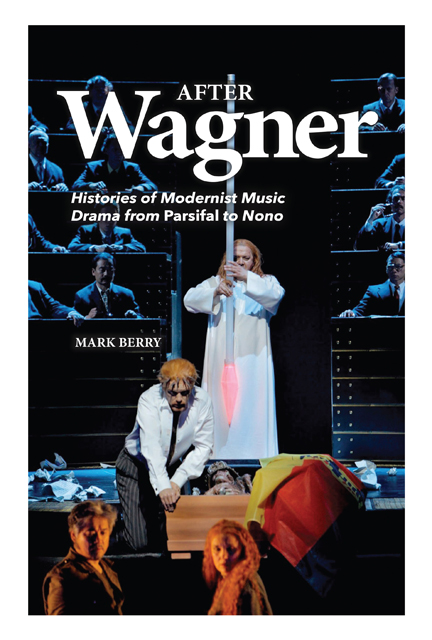Book contents
- Frontmatter
- Contents
- List of Music Examples
- Acknowledgements
- Dedication
- Introduction: ‘After Wagner’
- Part I In the Shadow of German Idealism: From Parsifal to Capriccio
- Part II Composition after the Second World War: From Germany to Italy, and Back Again?
- Part III Performance and the Fruitful Instability of the Work: From Parsifal to Nono
- Bibliography
- Index
7 - Stefan Herheim’s Parsifal
Published online by Cambridge University Press: 24 February 2023
- Frontmatter
- Contents
- List of Music Examples
- Acknowledgements
- Dedication
- Introduction: ‘After Wagner’
- Part I In the Shadow of German Idealism: From Parsifal to Capriccio
- Part II Composition after the Second World War: From Germany to Italy, and Back Again?
- Part III Performance and the Fruitful Instability of the Work: From Parsifal to Nono
- Bibliography
- Index
Summary
Having staged not just one but two Ring cycles, Keith Warner has become something of a Wagner veteran. In an interesting and, in the best sense, provocative essay, he points out that Wagner ‘almost single-handedly invented, certainly in opera’, the role of director, ‘almost certainly provoked into action by the work of the Duke of Saxe-Meiningen [George II] and his celebrated acting troupe’s artistic director, Ludwig Chronegk’, whose production of Kleist’s Der Hermannsschlacht he had seen in 1875, the year before the first Bayreuth Ring, ‘which Wagner chose to direct rather than conduct’. It is not difficult to imagine why, on a personal level, either Wagner or a modern stage director such as Warner should wish to further the Meiningen concept not only of greater professionalism – especially noteworthy for attention paid to individual members of the crowd – but also of a single authority presiding over a production, though it is not altogether clear that Wagner was following that concept rather than working in tandem with it. The directorial Konzept, beloved of devotees of modern Regietheater and detested by its opponents, stands not so very distant; although, by the same token, the Duke’s insistence upon naturalistic historical verisimilitude would find favour with opponents rather than devotees. It is likewise not difficult to understand why Wagner or modern directors should wish to lessen, and preferably to abolish, the cult of ‘star’ performers, a key feature of the Meiningen agenda – and a cause célèbre for all manner of operatic ‘reformers’ from at least Gluck and Calzabigi onwards. Theirs is no more a ‘neutral’ stance than any other; nor should it be. Yet their vision, for which there may be justification to speak of in the singular, which it is no exaggeration to consider both modern and modernistic, has held and continues to hold consequences for the understanding and experience of works both new and from the ‘museum’. The same might be said about the histories we write of those works and the performances which, for many, give them life – and history.
Leaving aside the swiftly outdated naturalism of the designs for Bayreuth’s first Ring – with which Wagner was in any case unhappy – what stands out from contemporary reports of rehearsals is, as Warner remarks, the abnormality of the composer-director’s approach.
- Type
- Chapter
- Information
- After WagnerHistories of Modernist Music Drama from Parsifal to Nono, pp. 210 - 233Publisher: Boydell & BrewerPrint publication year: 2014



